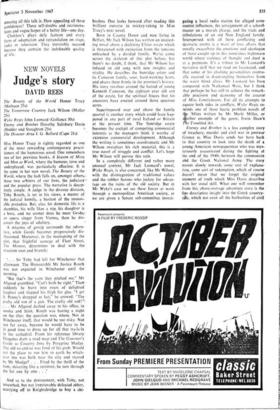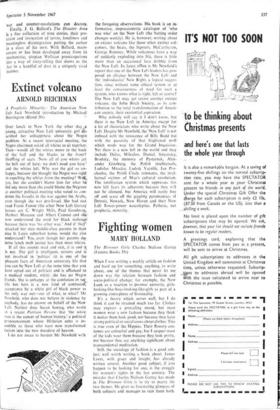NEW NOVELS
Judge's story
DAVID REES
The Beauty of the World Honor Tracy (Methuen 25s) The Tomorrow Country Jack Wilson (Muller 25s) Wyke Regis John Leonard (Gollancz 30s) Enemy and Brother Dorothy Salisbury Davis (Hodder and Stoughton 25s) The Disaster Area J. G. Ballard (Capi 21s)
Miss Honor Tracy is rightly regarded as one of the most rewarding contemporary practi- tioners of the humorous novel. One remembers two of her previous books, A Season of Mists and Men at Work, where the humour, terse and underplayed, was particularly effective. It is the same in her new novel, The Beauty of the World, where the lash falls on, amongst others, those two arbiters of our lives, the judiciary" and the popular press. The narrative is decep- tively simple. A judge in the divorce division, Toby Routh, is set in his views, a master of the judicial homily, a bastion of the immov- able prejudice. But, alas, his domestic life is a shambles, his wife likes a nip, his daughter is a bore, and no sooner does he meet Gerda, an opera singer from Vienna, than he dis-, covers the joys of adultery.
A miasma of gossip surrounds the adven- ture, while Gerda becomes progressively dis- illusioned. Moreover, in the mainspring of the plot, that frightful scourge of Fleet Street, The Meteor, determines to deal with the situation root and branch: . . Sir Toby had left for Winchester that afternoon. The Honourable Mr Justice Routh was not expected in Winchester until the morning.
"But that's the yarn they pitched me," Mr Allgood grumbled. "Can't both be right." Then suddenly he burst into roars of delighted laughter and slapped his thigh for glee. "I get it. Penny's dropped at last," he crowed. "The crafty old son of a gun. The crafty old sod!"
. Mr Allgood dashed away to his office, to smoke and think. Routh was having a night on the tiles; the question was, where. Not in Winchester itself, that would be too risky. Not too far away, because he would have to be in good time to dress up for all that tra-la-la in the cathedral. From his reference library Diogenes dretV a road map and The Gourmet's Guide to Country Inns by Peregrine Mudge. The old so-and-so was fond of his grub. Would not the place to run him to earth be which- ever inn was both near the city and starred by Mr Mudge? . . . Fired by the thrill of the hunt, shivering like a retriever, he tore through the list one by one . .
And so to the denouement, with Toby, not unscathed, but not irretrievably defeated either, scurrying off to Knightsbridge to buy a chi- ,
huahua. One looks forward after reading this brilliant exercise in mickey-taking to Miss Tracy's next novel.
Born in County Down and now living in Belfast, Mr Jack Wilson has written an interest- ing novel about a declining Ulster estate which is threatened with extinction from the tensions unleashed by a divided family. We've come across the skeleton of this plot before, but there's no doubt, I think, that Mr Wilson has infused an old song with new insights and vitality. He describes the Sunridge estate and its Cameron family, sour, hard-working Scots, and places them firmly in the province's history. His story revolves around the hatred of young Kenneth Cameron, the eighteen year old son of the estate, for the spiritual fences that his ancestors have erected around those spacious acres.
Superimposed over and above the family quarrel is another story which could have hap- pened in any part of rural Ireland or Britain at the present time. The Sunridge estate becomes the cockpit of competing commercial interests as the managers think it worthy of extensive commercial development. Although the writing is sometimes overdramatic and Mr Wilson overplays his rich material, this is a true novel of struggle and conflict. Let's hope Mr Wilson will pursue this vein.
In a completely different and rather more unusual context, Mr Jack Leonard's novel, Wyke Regis, is also concerned, like Mr Wilson, with the disintegration of traditional values and the robber barons who jockey for advan- tage on the ruins of the old society. But in Mr Wyke's case we see these forces at work through a metropolitan American society, as we are given a Senate sub-committee investi- gating a local radio station for alleged com- munist influences, the arraignment of a school- master on a morals charge, and the trials and tribulations of an old New England family. Interspersed with all these conflicting and dramatic events is a maze of love affairs that usually exacerbate the emotions and ideologies of those caught up in this sometimes nightmare world where violence of thought and deed is at a premium. It's a tribute to Mr Leonard's narrative skill that we read on fascinated, and that some of his clashing personalities eventu- ally succeed in disentangling themselves from the worst blind alleys. Mr I eonard has been compared with Nathanael West, but I think that perhaps he has still to achieve the remark- able precision and economy of the creator of Miss Lonelyhearts. For all its attempts to equate both sides in conflicts, Wyke Regis re- minds one of those hectic problem novels of lf,'fifties written by Mr Merle Miller, or ther example of the genre, Irwin Shaw's e Troubled Air. Enemy and Brother is a less complex story of treachery, murder and civil war in postwar Greece as Miss Davis sends her hero back to that country to look into the death of a young American newspaperman who was mys- teriously assassinated during the fighting at the end of the 1940s between the communists Old the Greek National Army. The story moves slowly towards some sort of explana- tion, some sort of redemption, which of course doesn't mean that we forget the original moment of truth which Miss Davis describes with her usual skill. What one will remember from this above-average adventure story is the 4e descriptive insight into the Greek country- sae, which not even all the barbarities of civil
war and counter-revolutions can destroy.
Finally, I. G. Ballard's The Disaster Area is a fine collection of nine stories, their pre- cision and invocation of terror, loneliness and meaningless disintegration putting the author in a class of his own. With Ballard, main- stream SF has been developed away from its mechanistic, utopian Wellsian preoccupations into a way of story-telling that shows us the fear in a handful of dust in a uniquely vivid manner.











































 Previous page
Previous page